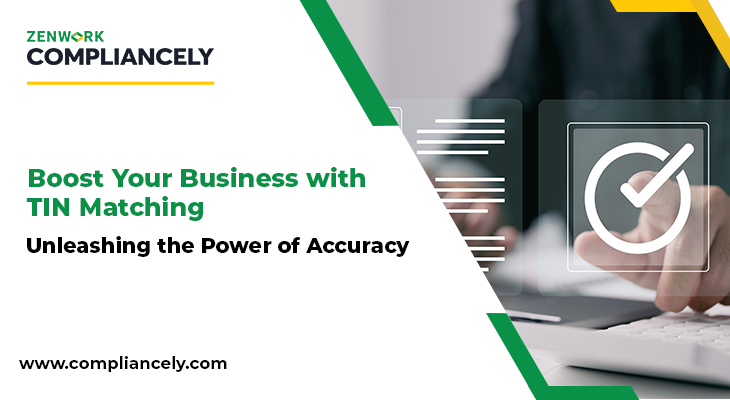
Boost Your Business with TIN Matching
Supercharge Your Business with TIN Matching: Unleash the Power of Accuracy! Say goodbye to costly tax errors, streamline vendor management, and mitigate fraud risks. Discover how TIN Matching can revolutionize your tax compliance efforts, protect your business, and pave the way for unprecedented growth. Don’t miss out on this secret weapon that ensures precision and propels your business toward success!
Did you know regulatory compliance is critical in today’s rapidly evolving business landscape? It’s true! A staggering 78% of businesses face significant penalties due to non-compliance with tax regulations.
But fear not because we have a game-changing solution that can turn the tides in your favour. Let us introduce you to TIN Matching – a powerful tool that ensures accurate tax reporting and prevents those costly errors.
So, buckle up and get ready to discover how TIN Matching can transform your tax compliance efforts and skyrocket your success. Get ready for a riveting journey where precision meets prosperity!
Let’s dive in, shall we?
Understanding TIN Matching: What Is It?
At its core, TIN Matching stands for Taxpayer Identification Number Matching. It’s a process that verifies the accuracy of Taxpayer Identification Numbers (TINs) by cross-referencing them with the records in the Internal Revenue Service (IRS) database. In simpler terms, it’s like a high-tech detective that ensures the TINs provided by your vendors, contractors, and other business partners match their names and other identifying information on file with the IRS.
But why is TIN Matching so crucial? Imagine this scenario: you’re diligently preparing your tax returns, only to discover that some of the TINs you used for reporting are incorrect or mismatched. This seemingly innocent mistake can lead to penalties and compliance issues.
TIN Matching is a safeguard, helping you catch and rectify those errors before they wreak havoc on your tax reporting. Validating TINs against the IRS database provides an added layer of confidence, ensuring your payee information is accurate and current.
Types of TINs (Taxpayer Identification Numbers)
When navigating the world of tax compliance, understanding the different types of Taxpayer Identification Numbers (TINs) is crucial. These unique identifiers are vital to inaccurate tax reporting and compliance with regulatory requirements. Let’s take a closer look at the common types of TINs you’re likely to encounter:
Employer Identification Number (EIN)
The Employer Identification Number, also known as the Federal Employer Identification Number (FEIN), is assigned to businesses and organizations by the Internal Revenue Service (IRS). This nine-digit number is used to identify employers for tax purposes, including filing employment tax returns, paying employee wages, and reporting business income.
Social Security Number (SSN)
The Social Security Number is a nine-digit identifier issued by the Social Security Administration (SSA) to individuals in the United States. It primarily serves as an identification number for individuals for various purposes, including tax reporting, government benefits, and employment verification.
Individual Taxpayer Identification Number (ITIN)
The Individual Taxpayer Identification Number is a nine-digit number issued by the IRS to individuals who are required to have a U.S. taxpayer identification number but are not eligible for a Social Security Number. ITINs are used for tax reporting purposes and are typically assigned to nonresident aliens, resident aliens, and individuals who are dependents or spouses of U.S. citizens or resident aliens.
Adoption Taxpayer Identification Number (ATIN)
The Adoption Taxpayer Identification Number is a temporary nine-digit number issued by the IRS for individuals legally adopting a child in the United States but who do not yet have an SSN. ATINs allow adoptive parents to claim the child as a dependent on their tax returns while awaiting the child’s official SSN.
It’s important to note that the specific type of TIN required for tax reporting depends on the nature of the taxpayer and their respective obligations. The EIN is the primary TIN used for tax reporting purposes for businesses. Individuals typically use their SSNs for personal tax reporting, while those ineligible for an SSN may obtain an ITIN.
The Benefits of TIN Matching for Businesses
TIN Matching, the process of verifying Taxpayer Identification Numbers (TINs) against the IRS database, offers many benefits for businesses. Let’s explore how TIN Matching can enhance tax compliance, streamline vendor management, and mitigate fraud risks.
Enhanced Tax Compliance
Avoiding penalties and legal consequences
Businesses can avoid costly penalties and legal repercussions by ensuring the accuracy of TINs before filing tax returns. TIN Matching is a proactive measure to identify and rectify discrepancies, reducing non-compliance risk.
Building a reputation for integrity
Accurate tax reporting demonstrates your commitment to compliance and integrity. By utilizing TIN Matching, businesses showcase their dedication to precise reporting, enhancing their reputation and credibility among clients, partners, and regulatory authorities.
Streamlined Vendor Management
Reducing payment errors and delays
TIN Matching minimizes payment errors caused by incorrect or mismatched TINs. By validating vendor information, businesses can ensure that payments are accurately processed, reducing the chances of payment delays or disruptions.
Ensuring accurate 1099 reporting
TIN Matching is crucial in preparing accurate 1099 forms for vendors and contractors. By verifying TINs against IRS records, businesses can confidently report payments, ensuring compliance with reporting obligations and avoiding potential audits or penalties.
Fraud Prevention and Risk Mitigation
Identifying potential identity theft or fraudulent activities
TIN Matching is a powerful tool for detecting potential identity theft or fraudulent activities. By comparing TINs against IRS records, businesses can flag discrepancies and take necessary steps to investigate and prevent fraudulent transactions.
Protecting your business and customers’ information
By implementing TIN Matching, businesses can safeguard sensitive financial information. Validating TINs helps ensure that only authorized individuals or entities are engaged in business transactions, reducing the risk of unauthorized access or data breaches.
How does TIN Matching Work?
TIN Matching is a powerful tool that ensures the accuracy of Taxpayer Identification Numbers (TINs) by comparing them against the records in the Internal Revenue Service (IRS) database. This process is crucial in achieving precise tax reporting and maintaining compliance. Let’s dive into how TIN Matching works:
TIN Validation and Verification Process
When a business engages in a transaction with a vendor, contractor, or other payee, their TIN is collected for tax reporting. TIN Matching involves validating and verifying the accuracy of these TINs. The process begins by submitting the TINs to the TIN Matching system, which then compares them against the records stored in the IRS database.
The TIN Matching system checks for an exact match between the TINs provided and the information in the IRS database. It verifies that the name associated with the TIN matches the one provided by the payee. This validation process ensures that the TINs on file are correct and up to date.
Integration with Existing Systems and Workflows
TIN Matching solutions can be seamlessly integrated into existing systems and workflows. They can be incorporated into accounting software, payment systems, or payroll platforms, enabling businesses to validate TINs during various processes.
The integration allows for automated TIN validation during data entry or payment processes. For example, when entering a vendor’s TIN into the system, the TIN Matching solution will perform a real-time check against the IRS database. If any discrepancies are detected, the system will flag them for further review or correction.
By integrating TIN Matching into existing systems, businesses can streamline their processes and ensure accurate tax reporting at the point of data entry, reducing the risk of errors and non-compliance.
Introducing Compliancely: Your Trusted TIN Matching Partner
Regarding TIN Matching, having a reliable and knowledgeable partner can make all the difference. That’s where Compliancely comes in. As a leading provider of TIN Matching services, Compliancely is dedicated to helping businesses navigate the complexities of tax compliance with ease and confidence.
Let’s explore what makes Compliancely the trusted choice for your TIN Matching needs:
Expertise and Experience
Compliancely boasts a team of tax compliance experts with in-depth knowledge and understanding of TIN Matching. With years of experience in the field, they are well-equipped to address the unique challenges businesses face regarding accurate tax reporting and compliance.
Cutting-Edge Technology
Compliancely harnesses the power of cutting-edge technology to provide efficient and effective TIN Matching solutions. Their advanced systems seamlessly integrate with your existing workflows, making the process smooth and hassle-free. Say goodbye to manual TIN validation and hello to automated, precise matching.
Comprehensive TIN Matching Services
Compliancely offers comprehensive TIN Matching services that cater to the specific needs of your business. Whether you require real-time TIN validation during data entry or batch processing for large volumes of TINs, they have you covered. Their services are designed to ensure accuracy, streamline your operations, and minimize compliance risks.
User-Friendly Interface
Compliancely understands that user experience is essential. Their user-friendly interface makes it easy for businesses of all sizes to navigate the TIN Matching process effortlessly. You’ll have access to intuitive features and functionalities that simplify TIN validation and verification, saving time and effort.
Seamless Integration
Compliancely’s TIN Matching solutions seamlessly integrate with your existing systems and workflows. Whether you’re using accounting software, payment platforms, or payroll systems, their integration capabilities allow for a smooth transition. This means you can incorporate TIN Matching seamlessly into your existing processes without disruption.
Exceptional Customer Support
Compliancely takes pride in providing exceptional customer support. Their dedicated support team can readily assist you with any queries or technical issues. They understand the importance of prompt and reliable assistance, ensuring your TIN Matching experience is smooth and stress-free.
